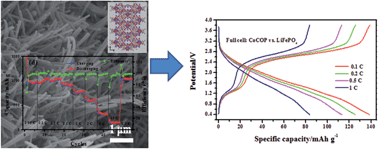Reversible lithiation–delithiation chemistry in cobalt based metal organic framework nanowire electrode engineering for advanced lithium-ion batteries
Abstract
As a challenging issue, minimizing metal organic framework (MOF) bulks to nanoscale is of great significance in deepening their application for energy storage, catalysis, sensing, etc. MOF nanostructures, particularly nanowires, are highly desirable because of their fast transport kinetics, good flexibility, and universal structural compatibility. Taking a polycarboxylate based cobalt coordination polymer (CoCOP) as an example, we presented one-dimensional (1D) MOF nanowires by a facile and scalable method. The CoCOP nanowires deliver an impressive lithium ion storage capacity of more than 1100 mA h g−1 at 20 mA g−1. Besides the high energy and power performance (875 W h kg−1 and 6422 W kg−1) comparable to that of recently advanced metal oxide hybrid electrodes, they also exhibit excellent long term cycling stability for more than 1000 cycles for fully reversible lithiation–delithiation chemistry based on a joint mechanism of intercalation-like structural deformation and Co2+/Co conversion reactions. Typical full cells with CoCOP nanowire anodes and commercial LiFePO4 powder cathodes (CoCOP–LiFePO4) also demonstrate excellent cyclability and fast charge–discharge capability with a capacity retention of 83% for more than 300 cycles at a 1C rate (1C corresponds to a one hour discharge process). Besides, a large capacity of 138 mA h g−1 at 0.1C and a high specific energy of 222 W h kg−1 (based on the total weight of CoCOP and LiFePO4) also substantiate their superior performance to common commercial energy storage and conversion devices.


 Please wait while we load your content...
Please wait while we load your content...